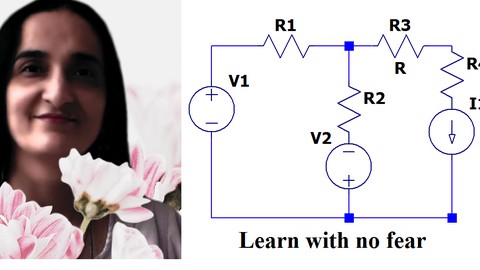
Electrical science
Electrical science, available at Free, has an average rating of 4.9, with 24 lectures, based on 46 reviews, and has 3131 subscribers.
You will learn about Basics of DC circuits, , Easy and interesting ways to solve the problems on electric circuits Combination of series and parallel resistances Voltage and current division Use of various advanced theorems in solving complicated networks This course is ideal for individuals who are Engineers of all branches and higher secondary classes It is particularly useful for Engineers of all branches and higher secondary classes.
Enroll now: Electrical science
Summary
Title: Electrical science
Price: Free
Average Rating: 4.9
Number of Lectures: 24
Number of Published Lectures: 18
Number of Curriculum Items: 28
Number of Published Curriculum Objects: 22
Original Price: Free
Quality Status: approved
Status: Live
What You Will Learn
- Basics of DC circuits, ,
- Easy and interesting ways to solve the problems on electric circuits
- Combination of series and parallel resistances
- Voltage and current division
- Use of various advanced theorems in solving complicated networks
Who Should Attend
- Engineers of all branches and higher secondary classes
Target Audiences
- Engineers of all branches and higher secondary classes
-
The course is focused on learning DC basics/networks and doing circuit analysis quite easily and without any fear. A network is supposed to be completely solved or analyzed when all voltages and all current in its different elements are evaluated or computed properly. Circuit analysis is the process of determining voltage across (or the current through) the elements present in the circuit (using Ohm’s law, Kirchhoff’s voltage law (KVL), Kirchhoff’s current law (KCL), nodal analysis, branch and mesh analysis, source transformation method, various important and fundamental theorems (such as Thevenin’s theorem, Norton’s theorem, Superposition), Star to Delta and Delta to Star transformation techniques). The course is intended to give a deep understanding of theory based on how to obtain steady state solution of DC circuits. It provides the basic knowledge for simplifying complex circuits and solving them analytically in a quite easy and effective way by applying network theorems. To apply fundamental theorems, a thorough understanding of each theorem is very much needed because analyzing of complex electrical and electronic circuits require these theorems very much. It provides numerous solved examples explained in detail and very easy way for a better understanding of the students. It also contains downloadable resources and assignments for practice. I assure the students that the course proves to be very useful to them and is of great help to all first year students.
Course Curriculum
Chapter 1: Introduction: about the course, about the instructor
Lecture 1: Course objective, glimpse of Characteristics of Series and Parallel Connection
Lecture 2: About the Instructor
Lecture 3: Voltage and current divider rules for n resistors
Lecture 4: Example 1 (using voltage and current divider rule)
Chapter 2: Section 2: Kirchhoff'laws and their applications in solving electric circuits
Lecture 1: KVL AND KCL
Lecture 2: Sign conventions for using KVL
Lecture 3: Branch current versus mesh current method
Lecture 4: Example 3: using branch current method
Lecture 5: Example 4: Mesh analysis
Lecture 6: SuperMesh technique: mesh analysis of a circuit having a current source
Chapter 3: Various powerful advanced techniques for solving complex circuits quickly
Lecture 1: Source transformation
Lecture 2: Superposition theorem
Lecture 3: Circuit Problem (i) on superposition theorem
Lecture 4: Thevenin theorem
Lecture 5: Problem on Thevenin
Lecture 6: Nortons theorem with example
Lecture 7: Wye/Delta Transformations
Lecture 8: Examples on Wye/Delta transformations
Instructors
-
Pooja Mohindru
Instructor
Rating Distribution
- 1 stars: 0 votes
- 2 stars: 1 votes
- 3 stars: 4 votes
- 4 stars: 13 votes
- 5 stars: 28 votes
Frequently Asked Questions
How long do I have access to the course materials?
You can view and review the lecture materials indefinitely, like an on-demand channel.
Can I take my courses with me wherever I go?
Definitely! If you have an internet connection, courses on Udemy are available on any device at any time. If you don’t have an internet connection, some instructors also let their students download course lectures. That’s up to the instructor though, so make sure you get on their good side!
You may also like
- Top 10 Virtual Reality Courses to Learn in December 2024
- Top 10 Augmented Reality Courses to Learn in December 2024
- Top 10 Blockchain Development Courses to Learn in December 2024
- Top 10 Unity Game Development Courses to Learn in December 2024
- Top 10 Artificial Intelligence Courses to Learn in December 2024
- Top 10 Flutter Development Courses to Learn in December 2024
- Top 10 Docker Kubernetes Courses to Learn in December 2024
- Top 10 Business Analytics Courses to Learn in December 2024
- Top 10 Excel Vba Courses to Learn in December 2024
- Top 10 Devops Courses to Learn in December 2024
- Top 10 Angular Courses to Learn in December 2024
- Top 10 Node Js Development Courses to Learn in December 2024
- Top 10 React Js Courses to Learn in December 2024
- Top 10 Cyber Security Courses to Learn in December 2024
- Top 10 Machine Learning Courses to Learn in December 2024
- Top 10 Ethical Hacking Courses to Learn in December 2024
- Top 10 Ui Ux Design Courses to Learn in December 2024
- Top 10 Aws Certification Courses to Learn in December 2024
- Top 10 Data Science Courses to Learn in December 2024
- Top 10 Digital Marketing Courses to Learn in December 2024






















